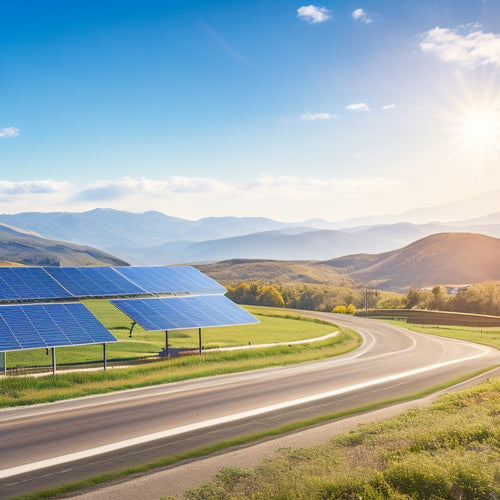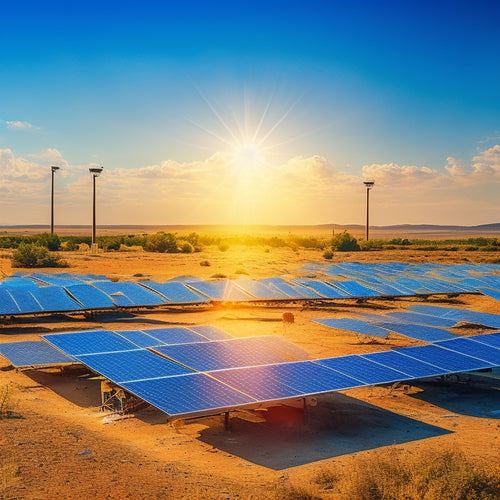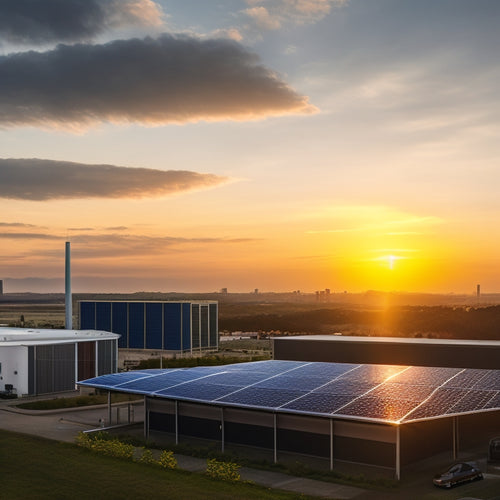
Solar Power for Small Business: A Beginner's Implementation Guide
Share
Implementing solar power for your small business can greatly cut energy costs and increase financial stability. Start by evaluating your daily energy needs and identify your peak usage hours to optimize your system's performance. Investigate various solar panel types to find the best fit for efficiency and budget. Take advantage of government incentives, like tax credits and rebates, to lower installation costs. With time, your investment in solar will lead to substantial savings and a reduced carbon footprint. As you investigate these practical steps, you'll uncover more about how solar can change your business operations.
At a Glance
- Assess your energy requirements by calculating daily usage and reviewing utility bills to determine optimal solar system size.
- Explore financing options, including loans, leases, and government incentives, to manage initial installation costs effectively.
- Choose the right solar panel type (monocrystalline, polycrystalline, or thin-film) based on efficiency and space considerations for your business.
- Utilize performance monitoring tools to track energy production and optimize system efficiency over time.
- Identify peak usage hours to align energy consumption with solar production, maximizing savings and minimizing costs.
Cost-Effective Energy Solution
Solar power can greatly lower your energy bills, allowing you to allocate funds more efficiently within your business.
By reducing energy costs, you can also stabilize expenses against price hikes, which is especially beneficial for rural businesses facing high electricity bills.
Additionally, various government incentives can help offset the initial investment, making this renewable energy source even more financially appealing solar investment tax credits.
Reduced Energy Bills
Businesses can see a significant reduction in energy bills by adopting solar power as a primary energy source. By investing in solar panels, you can capture the sun's energy, drastically cutting your reliance on traditional electricity sources. This shift not only lowers your monthly expenses but also stabilizes your energy costs in the long term.
When considering solar, you'll encounter various solar panel types, such as monocrystalline, polycrystalline, and thin-film. Each type has its advantages and costs, so choosing the right one for your specific needs is essential.
Understanding the installation methods—roof-mounted, ground-mounted, or solar carports—will also help you optimize the efficiency of your system while maximizing space.
As you implement solar power, keep in mind that your energy savings will grow over time. You'll notice immediate reductions in your utility bills, and as energy prices fluctuate, having your solar system means greater financial freedom.
Investing in solar isn't just about cutting costs; it's a step towards energy independence. By committing to this clean energy source, you're not only benefiting your business but also contributing to a sustainable future.
Government Incentives Available
With the potential for reduced energy bills through solar power, many small businesses can also take advantage of various government incentives designed to make this shift even more cost-effective.
Understanding these options is essential for maximizing your investment. Federal tax credits, like the Investment Tax Credit (ITC), allow you to deduct a significant percentage of your solar installation costs from your federal taxes.
Many states offer rebates that further lower upfront expenses. Additionally, solar grants can help offset installation costs, making solar energy more accessible.
Consider exploring financing options specifically designed for small businesses, which can ease the burden of initial costs. Installation incentives can also provide substantial savings during the setup phase.
Moreover, by participating in small business programs, you could gain access to renewable energy certificates, which can provide an additional revenue stream.
Environmental Sustainability Advantages
Switching to solar power greatly reduces your business's carbon footprint, helping combat climate change.
By utilizing renewable energy, you also gain energy independence, shielding your operations from fluctuating utility costs.
Additionally, financial incentives such as tax credits and rebates can further enhance your savings.
These sustainability advantages not only enhance your brand image but also create a more resilient business model.
Reduced Carbon Footprint
Regularly adopting solar power can greatly reduce your small business's carbon footprint, making a positive impact on the environment. By switching to solar energy, you're not just opting for a renewable power source; you're actively engaging in sustainable practices that contribute to a healthier planet. This shift helps decrease your reliance on fossil fuels, which are major contributors to greenhouse gas emissions.
Implementing solar panels allows your business to engage in effective carbon offset strategies. For every watt of solar energy you produce, you're reducing the demand for energy generated from non-renewable sources. This means fewer emissions and a cleaner atmosphere.
Additionally, by producing your own energy, you minimize the carbon impact associated with energy transportation and distribution.
Incorporating solar power into your business model isn't just good for the planet; it also enhances your brand image. Consumers today often favor environmentally conscious businesses, and your commitment to reducing your carbon footprint can attract like-minded customers.
Ultimately, shifting to solar energy not only supports your business goals but also aligns with a vision for a sustainable future, giving you the freedom to operate responsibly and ethically.
Energy Independence Benefits
Embracing solar power not only helps reduce your carbon footprint but also paves the way for energy independence. By investing in solar energy, you gain energy autonomy, allowing your business to thrive without the constraints of fluctuating utility rates. This independence enhances your resilience against potential energy shortages or price hikes, promoting stability and growth.
Here's a quick overview of the benefits of solar power for your business:
| Benefit | Description |
|---|---|
| Energy Cost Savings | Lower monthly utility bills increase your profit margins. |
| Enhanced Business Growth | Reliable energy access supports operational efficiency and expansion. |
| Positive Brand Image | Eco-friendly practices attract environmentally-conscious customers. |
With solar energy, you're not just investing in a power source; you're creating a pathway to sustainable business growth. By utilizing the sun's energy, you position your business as a leader in environmental responsibility. In a world increasingly focused on sustainability, energy independence through solar power can be a game changer, enabling you to focus on what truly matters: your business's success.
System Efficiency Metrics
To maximize your solar investment, understanding system efficiency metrics is vital.
Energy conversion efficiency indicates how well your solar panels convert sunlight into electricity, while performance monitoring tools help you track and optimize this efficiency over time.
Additionally, considering battery capacity sizing is important for guaranteeing your energy storage matches your solar output.
Energy Conversion Efficiency
Energy conversion efficiency is essential for small businesses looking to maximize the benefits of solar power. This metric measures how effectively your solar panels convert sunlight into usable electricity. Higher efficiency means you'll generate more electricity from the same amount of sunlight, which is critical for optimizing your investment in solar technology.
When choosing solar panel types, consider their efficiency ratings. Monocrystalline panels typically offer the highest efficiency, making them a popular choice for small spaces where every inch counts. Polycrystalline panels, while slightly less efficient, can be more budget-friendly and still provide substantial energy production.
Energy storage systems, like batteries, play a significant role in overall energy conversion efficiency. By storing excess energy generated during peak sunlight hours, you can use it during low-sunlight times, reducing reliance on grid power. This not only maximizes your solar investment but also enhances your energy independence.
Incorporating high-efficiency panels and a strong energy storage solution can greatly improve your system's performance. By focusing on these factors, you can guarantee your small business utilizes the full potential of solar energy, promoting sustainability and financial freedom.
Performance Monitoring Tools
Effective performance monitoring tools are essential for ensuring your solar power system operates at peak efficiency. By utilizing advanced monitoring technologies, you can gain understanding into your system's performance and make informed decisions. These tools help you visualize data and track key metrics that indicate how well your solar setup is functioning.
To help you comprehend the important metrics to monitor, here's a quick reference table:
| Metric | Description |
|---|---|
| Energy Production | Total energy generated by the system |
| System Availability | Percentage of time the system is operational |
| Performance Ratio | Actual output vs. expected output |
| Capacity Factor | Ratio of actual output to maximum possible output |
| System Losses | Energy lost due to inefficiencies |
Assess Your Energy Requirements
To effectively utilize solar power for your small business, you first need to calculate your daily energy needs. This involves identifying not just the total energy consumption but also pinpointing your peak usage hours.
Conducting an energy audit can help assess your energy needs by highlighting high-wattage appliances and their power requirements. Understanding these factors will enable you to design a solar system that meets your specific demands.
Calculate Daily Energy Needs
Understanding your daily energy needs is crucial for any small business considering solar power. To get started, you'll want to evaluate your energy consumption by reviewing your utility bills. Look for the total kilowatt-hours (kWh) used each month, then divide that number by 30 to find your average daily usage. This figure will help you determine how much energy your solar system needs to produce.
Next, consider the equipment you use—lighting, HVAC systems, computers, and other appliances all contribute to your overall energy needs. Make a list of these devices, noting their wattage and the average hours they run each day. By doing this, you can calculate the total energy consumption for each device and add them up.
Once you have this total, you can begin the solar sizing process. This involves determining the size of the solar system required to meet your daily energy needs.
Remember to factor in potential energy efficiency improvements and seasonal variations in sunlight to guarantee your solar system can provide reliable power year-round. Taking these steps will set you on the right path to utilizing solar energy effectively.
Identify Peak Usage Hours
Identifying your peak usage hours is essential for optimizing your solar power system. By analyzing your energy requirements, you can adjust your usage patterns to align with solar production, maximizing energy conservation and minimizing costs. Understanding your peak demand periods—when energy consumption is highest—helps you make informed decisions about your solar setup.
Consider the following table to help you visualize typical peak usage hours:
| Time of Day | Usage Pattern |
|---|---|
| 6 AM - 9 AM | Moderate Demand |
| 9 AM - 12 PM | Low Demand |
| 12 PM - 3 PM | High Demand |
| 3 PM - 6 PM | Very High Demand |
Long-Term Savings Potential
When you switch to solar power, you can greatly reduce your energy costs over time.
By generating your own electricity, you'll rely less on fluctuating utility rates, which means more predictable expenses for your business.
This long-term savings potential can free up capital for other important investments.
Reduced Energy Costs
Reducing energy costs through solar power presents an enticing opportunity for small businesses looking to enhance their bottom line. By investing in solar installation, you can considerably cut your monthly energy bills and increase your financial flexibility.
The initial investment might seem intimidating, but various financing options, like loans or leases, can make this shift more manageable.
Think about it: with a well-planned solar setup, you'll not only minimize your reliance on the grid but also shield your business from fluctuating energy prices. This long-term savings potential means more capital for you to invest back into your operations, helping you to grow and thrive.
Additionally, many states offer incentives and tax credits that can further offset installation costs, making solar power a financially savvy choice. By analyzing your energy needs and exploring different financing options, you can create a customized plan that aligns with your business goals.
In the end, adopting solar power isn't just an environmentally friendly move; it's a strategic decision that can lead to substantial savings and greater freedom in managing your business finances. Welcome the change, and watch your savings soar.
Frequently Asked Questions
What Type of Solar Panels Are Best for Small Businesses?
When choosing solar panel types for your small business, consider monocrystalline panels for their superior energy efficiency and space-saving design. Polycrystalline panels are more affordable but slightly less efficient. Evaluate your budget and energy needs before deciding.
How Can I Find a Reliable Solar Installer?
To find a reliable solar installer, check their qualifications, read reviews, and ask about their installation timeline. Comparing multiple quotes helps guarantee you choose an installer who meets your needs and supports your energy independence.
Are There Local Incentives for Installing Solar Power?
Did you know that over 80% of solar installations benefit from tax credits and utility rebates? Check local programs; you might find additional incentives that make adopting solar power even more financially appealing for your goals.
What Maintenance Is Required for Solar Systems?
To keep your solar system efficient, you'll need regular solar panel cleaning and system monitoring. Checking for debris, ensuring peak performance, and addressing any issues promptly will maximize energy production and extend your system's lifespan.
Can Solar Power Work During Cloudy or Rainy Days?
Yes, solar power can still generate energy on cloudy or rainy days, though solar efficiency decreases. Understanding weather impact helps you plan better, ensuring reliable energy supply even when sunlight isn't at its peak.
Explore More
By welcoming solar power, you're not just powering your small business; you're lighting the path to a sustainable future. Imagine the sun's rays converting into savings, reducing your carbon footprint while energizing your operations. As you assess your energy needs and system efficiency, you'll see the potential for long-term financial relief, like a warm glow in your budget. It's time to utilize this cost-effective energy solution and watch your business thrive under the bright welcome of renewable power.
Related Posts
-

Is Switching to Green Energy Solutions Easy
Switching to green energy solutions isn't just easy; it's also beneficial. You can greatly cut utility costs and enjo...
-

What Happens Without a Charge Controller in Solar Panels
Without a charge controller in your solar panel system, you risk overheating batteries due to overcharging, which can...
-

Advantages of Commercial Solar Battery On-Site Storage
By investing in a commercial solar battery on-site storage system, you can greatly reduce your energy grid dependence...


